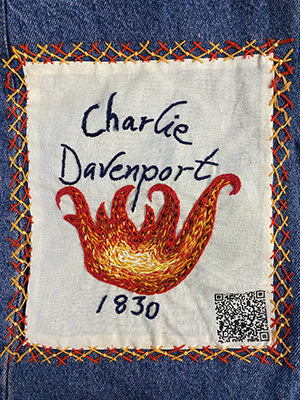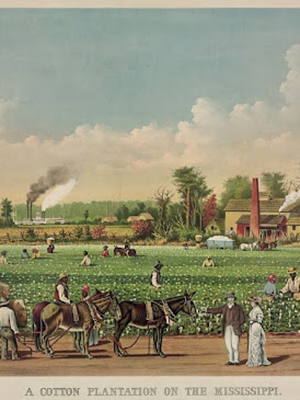Charlie Davenport
"I was named Charlie Davenport and according to the way I figure, I ought to be nearly a hundred years old. Nobody knows my birthday. I was born one night and the very next morning my poor little mammy died. Her name was Lucindy. My pa was William Davenport. Aventine, where I was born and bred, was across Second Creek. It was a big plantation with about a hundred head of folks a-living on it. The master was Honorable Mister Gabriel Shields himself. I’m part Indian. I’ve often heard my mammy (had) long, straight, black hair. Her pa was a full blooded Choctaw. The Choctaws lived all around Second Creek. Some of them had cabins like settled folks. I can remember their last chief. He was a tall powerful built man named Big Sam. The overseer’s little gal got it in for me. One day she hit me with a stick and I threw it back at her. About that time up walked her pa. He seen what I done, but he didn't see what she done to me. But it wouldn’t a-made no difference, if he had. He snatched me in the air and toted me to a stump and laid me across it. I didn’t have but one thickness ‘twixt me and daylight. He laid it on me with that stick. I thought I'd die. All the time this mean little gal was a-gloating in my misery. I yelled and prayed to the Lord ‘til he quit. Then he say to me, “From now on you works in the field.” I was too little for field work, but the next morning I went to chopping cotton. After that the Yankees come a-swooping down on us. My own pappy took off with them. He joined a company what fought at Vicksburg. I was on a plantation closer to town, then. The white folks come and told us we must burn all the cotton so the enemy couldn’t get it. We piled it high in the fields like great mountains. It made my innards hurt to see fire attached to something that had cost us so much labor and honest sweat. If I could have hid some of it in the barn I'd have done it, but the boss searched everywhere.” – Charlie Davenport
 Sabrina Goldsmith ’25
Sabrina Goldsmith ’25
The British saw the destruction and devastation brought to the Southern plantations during the Civil War as a potential opportunity to increase their profits in the global cotton industry. In the 1850’s Britain felt it was too dependent on its former colony because 77% of the cotton they imported was grown in the US. But by 1862 the South had plummeted from exporting 3.8 million bales of cotton to zero. The North had created a blockage to defund the South, and the South had placed an embargo on cotton exports to try to gain support from the British. As a result, British factories closed and the Empire scrambled around to find other lands to colonize for raw materials. They ramped up their cotton cultivation in India, Egypt, and Brazil, affecting both the ecological and social environments in their wake.
Sources
- Federal Writers' Project: Slave Narrative Project, Vol. 9, Mississippi, Allen-Young. 1936. Manuscript/Mixed Material. Federal Writers' Project: Slave Narrative Project, Vol. 9, Mississippi, Allen-Young | Library of Congress.
- Empire of Cotton - The Atlantic
- Cotton - Essential Civil War Curriculum
